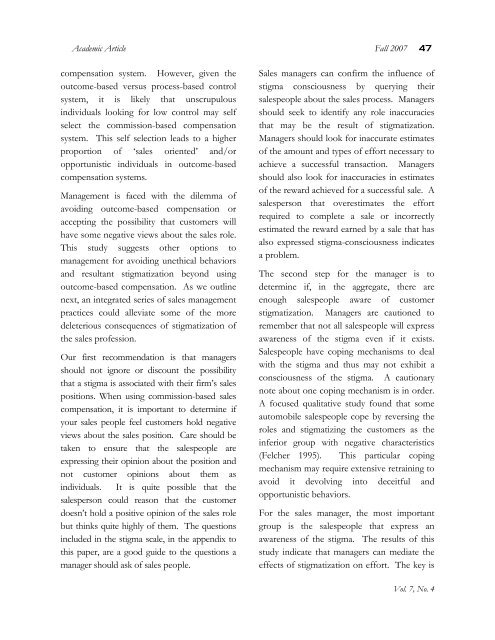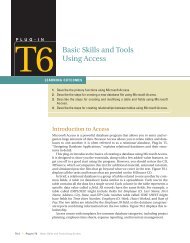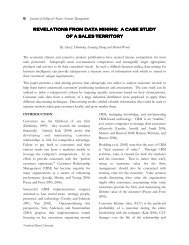The Impact of Stigma: Negative Stereotypes of Salespeople
The Impact of Stigma: Negative Stereotypes of Salespeople
The Impact of Stigma: Negative Stereotypes of Salespeople
Create successful ePaper yourself
Turn your PDF publications into a flip-book with our unique Google optimized e-Paper software.
Academic Article Fall 2007 47compensation system. However, given theoutcome-based versus process-based controlsystem, it is likely that unscrupulousindividuals looking for low control may selfselect the commission-based compensationsystem. This self selection leads to a higherproportion <strong>of</strong> ‘sales oriented’ and/oropportunistic individuals in outcome-basedcompensation systems.Management is faced with the dilemma <strong>of</strong>avoiding outcome-based compensation oraccepting the possibility that customers willhave some negative views about the sales role.This study suggests other options tomanagement for avoiding unethical behaviorsand resultant stigmatization beyond usingoutcome-based compensation. As we outlinenext, an integrated series <strong>of</strong> sales managementpractices could alleviate some <strong>of</strong> the moredeleterious consequences <strong>of</strong> stigmatization <strong>of</strong>the sales pr<strong>of</strong>ession.Our first recommendation is that managersshould not ignore or discount the possibilitythat a stigma is associated with their firm’s salespositions. When using commission-based salescompensation, it is important to determine ifyour sales people feel customers hold negativeviews about the sales position. Care should betaken to ensure that the salespeople areexpressing their opinion about the position andnot customer opinions about them asindividuals. It is quite possible that thesalesperson could reason that the customerdoesn’t hold a positive opinion <strong>of</strong> the sales rolebut thinks quite highly <strong>of</strong> them. <strong>The</strong> questionsincluded in the stigma scale, in the appendix tothis paper, are a good guide to the questions amanager should ask <strong>of</strong> sales people.Sales managers can confirm the influence <strong>of</strong>stigma consciousness by querying theirsalespeople about the sales process. Managersshould seek to identify any role inaccuraciesthat may be the result <strong>of</strong> stigmatization.Managers should look for inaccurate estimates<strong>of</strong> the amount and types <strong>of</strong> effort necessary toachieve a successful transaction. Managersshould also look for inaccuracies in estimates<strong>of</strong> the reward achieved for a successful sale. Asalesperson that overestimates the effortrequired to complete a sale or incorrectlyestimated the reward earned by a sale that hasalso expressed stigma-consciousness indicatesa problem.<strong>The</strong> second step for the manager is todetermine if, in the aggregate, there areenough salespeople aware <strong>of</strong> customerstigmatization. Managers are cautioned toremember that not all salespeople will expressawareness <strong>of</strong> the stigma even if it exists.<strong>Salespeople</strong> have coping mechanisms to dealwith the stigma and thus may not exhibit aconsciousness <strong>of</strong> the stigma. A cautionarynote about one coping mechanism is in order.A focused qualitative study found that someautomobile salespeople cope by reversing theroles and stigmatizing the customers as theinferior group with negative characteristics(Felcher 1995). This particular copingmechanism may require extensive retraining toavoid it devolving into deceitful andopportunistic behaviors.For the sales manager, the most importantgroup is the salespeople that express anawareness <strong>of</strong> the stigma. <strong>The</strong> results <strong>of</strong> thisstudy indicate that managers can mediate theeffects <strong>of</strong> stigmatization on effort. <strong>The</strong> key isVol. 7, No. 4
















